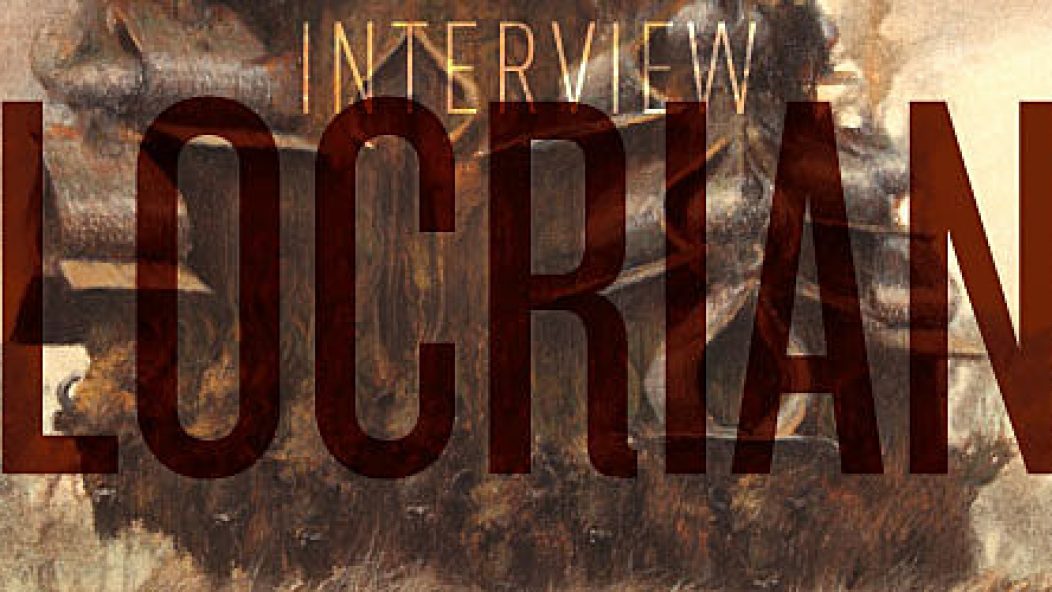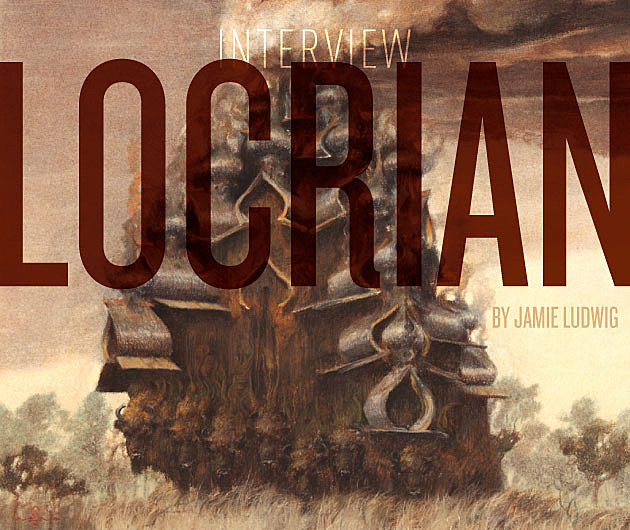
Interview: Locrian

When two of the most innovative groups in heavy music today — Chicago-based avant-garde trio Locrian and Seattle art/drone duo Mamiffer — announced they were teaming up for a studio collaboration, the resulting album, Bless Them That Curse You (Profound Lore/SIGE/Utech), quickly became one of the earliest “most-anticipated” releases of 2012 among fans of experimental and extreme music.
Comprised of co-founders André Foisy and Terence Hannum, along with percussionist Steven Hess, Locrian has been challenging listeners with concoctions of ambient noise, black metal, extreme electronics, and free jazz (among other styles), since 2005. Locrian certainly don’t seem to lack either creativity or industriousness, having produced upwards of 25 releases, often packaged in limited editions and in a variety of formats. Their fourth and most recent full-length, The Clearing (Fan Death), was released last fall to critical acclaim.
Mamiffer is the project of husband-and-wife duo Aaron Turner (whom you may remember from such acts as Isis and House of Low Culture) and Faith Coloccia (former Everlovely Lightningheart). Mamiffer’s 2008 debut full-length, Hirror Enniffer (Hydra Head) was an otherworldly exploration marked with unfamiliar, often uncomfortable pairings, such as a simple, clean piano melody layered over a menacing cloud of grey fuzz.
Produced by Greg Norman at Electrical Audio Studios in Chicago, Bless Them That Curse You contains many harsh, noise-laden, epic moments, but its overall tone is one of beauty and grace, wrapped in a darkness that feels more questioning than foreboding, and more mysterious than dismal. Although the material was largely improvised in the studio, the album sounds as though its members had been crafting music as a single unit for years.
Just days before the album’s February 28 release date, I conducted a lengthy interview with members of Locrian. For the rest of the interview with Foisy and Hess about the making of the record and the unique experience of collaborating with relative strangers, visit my blog, Uneasy Listening.
. . .
Did the idea to collaborate on an album with Mamiffer come out of the shows you played together last summer?
André Foisy: Aaron and I had been trading records for a while, and out of all the records he sent me, Mamiffer was the one I felt most moved by, and I said that to them. Locrian was working with Utech Records, who decided to put on a festival [in Milwaukee] last June. Faith and Aaron said, “We’re coming out to the Midwest. Would you be interested in doing some shows together or collaborating?” At first our reaction was, “Jeez, we’re really busy. Shit, I don’t know…”.
Aaron and I started teasing out some ideas, and we shot it to a few labels. A bunch of them were interested and Profound Lore seemed like they were the most supportive. Then we asked Faith and Aaron, “Where do you want to record?” Aaron said, “Well, everyone says Greg Norman at Electrical Audio is good.” Electrical Audio had never come into our minds because it’s kind of expensive to record there.
Steven Hess: Profound Lore was nice enough to advance us the money and pay for the recording sessions. Then everything went perfectly — the timing for everyone to come here, the festival, then we played Montreal, Toronto, and Chicago, and did a few shows with them. It was a lot of fun.
What is it like to go into a studio with someone you’ve never played with before and make a record?
SH: It was a little weird, but it was kind of relaxing. They are really mellow, and easy to get along with. We seemed to have similar ideas. We didn’t think [the record] had to be huge. We slowly made baby steps with each track, adding things, and if it didn’t work we tried something else. Trial and error. Most of it worked really well.
AF: We planned to have more thought-out ideas before we went into the studio. We were supposed to hang out with Aaron and Faith and Travis [Rommereim, longtime Mamiffer collaborator and percussionist] and jam, but then the storm, which is pictured on the cover of the album, delayed their travels. We ended up meeting the next day in the studio and you know — typical day in the studio — I was there and I had breakfast ready and everyone was running late and I was a little stressed out, but everything worked out. We ended up working on the last song on the record [“Metis/Amaranthine/the Emperor”] for most of the day, which is by far my favorite song on the whole record.
It seems like the whole record is kind of building to that point.
SH: Yeah, it is. The record is bookended by these two powerful tracks [the other being “In Fulminic Blaze”], but I think it is this storyline that is taking you to the last track. There was a theme that we started talking about once we started the track, based around the weather, their travels…
AF: I wanted to contrast acoustic instruments with extreme electronic instruments, and that worked out to a certain extent. That’s where we got the first track, and it sort of morphed into something else.
The relationship between the listener and music is something that repeatedly comes up when you talk about Locrian. The number of limited releases and formats that you do suggests that it’s not just about the relationship between the music and the listener, but between the band and the listener. What is the importance of engaging the listener in a way that says, “Here, this is what we’ve been up to lately,” where other musicians might just record those tapes and file them away?
AF: I feel like it’s really complicated in this day and age and there is so much shit to sift through, it’s daunting. I like tapes and records because you have to have this physical interaction with them, and a lot of people still like CDs. Our relationship with our format is changing too. The medium is the meaning. I don’t know if I can explain it any more than that. With this release we’re doing a CD, a record, a tape, and a Japanese version, and it’s all the same material. If I was going to analyze it, I’d say, “We’re collaborating with a lot of cool people, and I’m excited about that,” so maybe that’s what that says? All of these cool people that have helped us out.
SH: We want it to get out there, we want people to hear it, so we have different formats to cover all the bases so that all the people we want to hear it can hear it.
AF: In general, I hope that people listen to it, and I hope it maybe fucks with some Isis fans a little. Going on tour with Aaron was funny because he has all these little boy fans, and they’re all, “Whoa, what’s Aaron Turner like?” and I’d say, “He’s cool. He really likes vegetables and he doesn’t drink too much.”
It seems like his fans have followed him beyond Isis.
SH: I have never heard a proper Isis record. I’ve only heard the remixed albums, because Fennesz did a remix and they were on tour together for a little bit, so that’s the only thing I’ve heard of Isis. I know it’s epic, heavy rock. I like that I don’t know and it was great for me in the studio because I didn’t know anything other than the Mamiffer record to go off of.
When you go into the studio with someone and you know all of their music versus if you don’t, it must be a really different experience.
SH: I think it would be intimidating and more stressful. Maybe it would [subconsciously] force you to go in whatever direction it is that this person has been playing in. [In this case] I had no idea, so it was just, “Let’s just create something. Let’s do it.”
HEAR LOCRIAN
. . .
HEAR BLESS THEM THAT CURSE YOU
Locrian and Mamiffer – “In Fulminic Blaze”
. . .
BUY BLESS THEM THAT CURSE YOU
Utech Records (2xLP)
Profound Lore Records (CD, March 6)
Land of Decay (cassette, release date to be announced)
. . .











